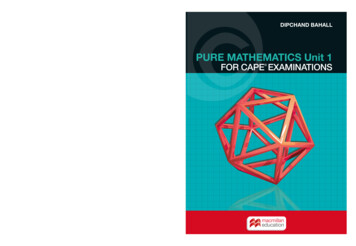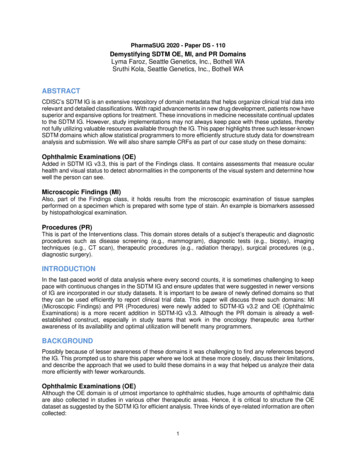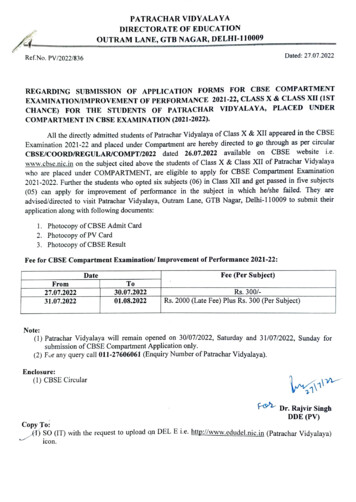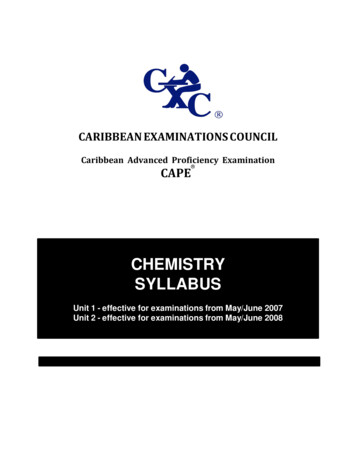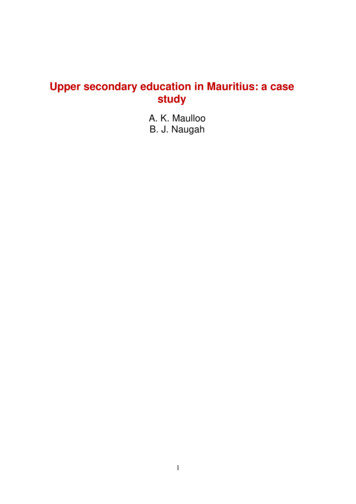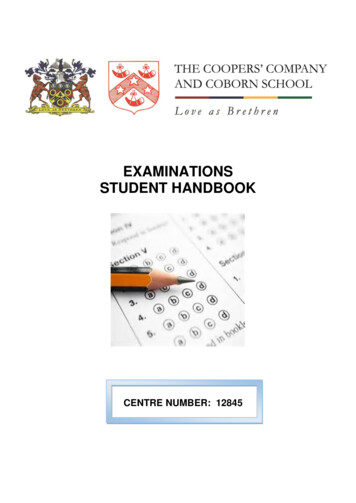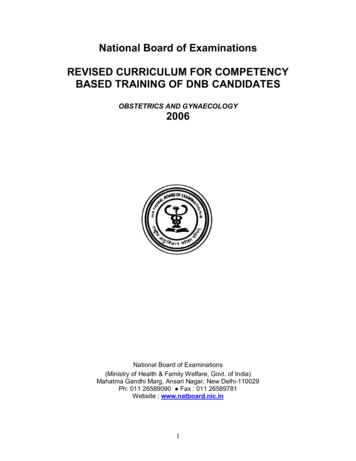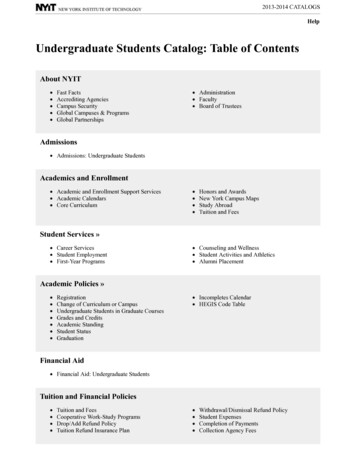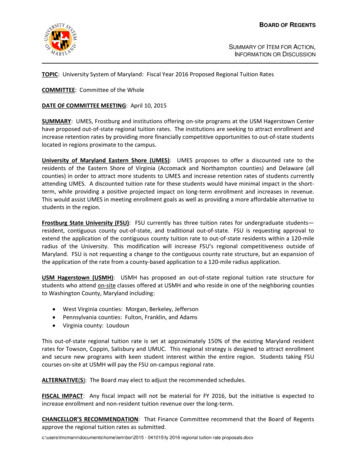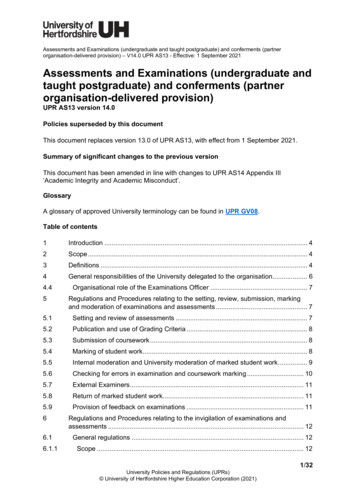
Transcription
Assessments and Examinations (undergraduate and taught postgraduate) and conferments (partnerorganisation-delivered provision) – V14.0 UPR AS13 - Effective: 1 September 2021Assessments and Examinations (undergraduate andtaught postgraduate) and conferments (partnerorganisation-delivered provision)UPR AS13 version 14.0Policies superseded by this documentThis document replaces version 13.0 of UPR AS13, with effect from 1 September 2021.Summary of significant changes to the previous versionThis document has been amended in line with changes to UPR AS14 Appendix III‘Academic Integrity and Academic Misconduct’.GlossaryA glossary of approved University terminology can be found in UPR GV08.Table of contents1Introduction . 42Scope . 43Definitions . 44General responsibilities of the University delegated to the organisation. 64.45Organisational role of the Examinations Officer . 7Regulations and Procedures relating to the setting, review, submission, markingand moderation of examinations and assessments . 75.1Setting and review of assessments . 75.2Publication and use of Grading Criteria . 85.3Submission of coursework . 85.4Marking of student work . 85.5Internal moderation and University moderation of marked student work . 95.6Checking for errors in examination and coursework marking . 105.7External Examiners . 115.8Return of marked student work . 115.9Provision of feedback on examinations . 1166.16.1.1Regulations and Procedures relating to the invigilation of examinations andassessments . 12General regulations . 12Scope . 12University Policies and Regulations (UPRs) University of Hertfordshire Higher Education Corporation (2021)1/32
Assessments and Examinations (undergraduate and taught postgraduate) and conferments (partnerorganisation-delivered provision) – V14.0 UPR AS13 - Effective: 1 September 20216.1.2Ratio of Invigilators to candidates. 126.1.3Role and responsibilities of Invigilators (see Appendix III, UPR AS13) . 126.2The Organisation’s Invigilators . 126.3Invigilation of other kinds of examinations and assessments . 136.3.17General regulations . 13Regulations and Procedures relating to examinations supervised by theexaminations officer . 137.1Scheduling of examinations (including referred/deferred examinations) . 137.2Setting and moderation of examination papers - roles and responsibilities withinOrganisations. 147.2.1Principals . 147.2.2Module Leaders . 147.2.3Internal Moderator . 157.2.4Copy Editor . 157.3Preparation of examination papers . 167.3.1General regulations and procedures . 167.3.3Format of examination papers . 177.4Submission of completed examination papers to the Examinations Officer . 177.4.2Deadline for the submission of completed examination papers . 177.4.3Late submission of examination papers . 177.5Reproduction of papers for the examination and provision of examinationstationery . 187.6The process of examination. 187.6.1Role and responsibilities of the Invigilator . 187.6.2Role and responsibilities of Module Leaders . 187.6.3Role and responsibilities of the Examinations Officer . 187.6.4Procedure in the event of an emergency during the examination . 197.6.5Regulations and procedures relating to unsafe examinations . 197.6.6Procedure in the event of a major disturbance . 197.7Collection of examination scripts from the Examinations Officer following theexamination . 207.8Marking of examination scripts . 207.9Storage and archiving of examination scripts . 208Regulations and Procedures relating to suspected assessment and examinationoffences . 208.1General regulations . 208.2Suspected offences which occur in the examination room . 218.2.1Unauthorised material . 218.2.2Other offences . 212/32University Policies and Regulations (UPRs) University of Hertfordshire Higher Education Corporation (2021)
Assessments and Examinations (undergraduate and taught postgraduate) and conferments (partnerorganisation-delivered provision) – V14.0 UPR AS13 - Effective: 1 September 20218.3Suspected offences identified during marking . 218.4Suspected coursework assessment offences . 219Consideration of results by Boards of Examiners . 229.1General . 229.2Clerks to Boards of Examiners (Module and Programme) . 229.3Absence of an External Examiner from a Board of Examiners meeting . 229.4Module Boards of Examiners . 229.4.2Role and responsibilities of Module External Examiners. 229.4.3Generation and approval of the final version of the E9 form . 239.5Programme Boards of Examiners . 239.5.1General regulations . 239.5.2Preparations for a Programme Board of Examiners meeting . 259.5.3During the Programme Board of Examiners meeting . 259.5.4Following the Programme Board of Examiners meeting . 251010.1Publication of Results. 27General regulations and procedures . 2710.1.2Lists of referrals/deferrals and failures . 2710.1.3Notification of results to candidates . 2710.1.4Award Pass Lists . 2810.1.5Issuing of Transcripts from the University’s Student Record System . 2810.1.6Transcripts which cannot be produced from the University’s Student RecordSystem . 2810.1.7Data Protection and the disclosure of marks/results . 2910.2Prizes . 2911Queries about recommendations or decisions on assessment, progression andawards (including appeals) . 3012The conferment and certification of awards . 3012.112.1.212.2Conferment of Awards . 30Date of conferment (date from which awards are effective) . 30Certificates and duplicate award certificates . 3012.2.1Certificates . 3012.2.2Format of certificates . 3112.2.3Duplicate certificates . 311313.1Graduation Ceremonies for the presentation of graduates who have receiveddegrees and diplomas . 32General regulations . 32University Policies and Regulations (UPRs) University of Hertfordshire Higher Education Corporation (2021)3/32
Assessments and Examinations (undergraduate and taught postgraduate) and conferments (partnerorganisation-delivered provision) – V14.0 UPR AS13 - Effective: 1 September 20211Introduction1.1With the exception of examinations and assessments deferred or referred from theAcademic Year 2020-2021, the regulations, procedures and guidelines set out inthis document (UPR AS13) will apply to all examinations and assessmentsconducted on or after 1 September 2021 at Partner Organisations.1.2This document should be read in conjunction with UPR AS11 1; UPR AS14 2;individual programme regulations; where applicable, the regulations of externalvalidating bodies and UPR SA03 3/UPR SA02 4.2Scope2.1All members of staff, candidates and relevant University or OrganisationCommittees and Boards are required to comply with the regulations, proceduresand guidelines set out in this document, which apply to the examination andassessment of all taught programmes delivered and assessed by PartnerOrganisations (as defined in section 3, v) that lead to approved awards of theUniversity of Hertfordshire.2.2The University requires that the principles embodied in these regulations areapplied universally in the examination and/or assessment of all credit bearingmodules leading to awards of the University of Hertfordshire.3DefinitionsFor the purposes of this document the following definitions will apply:i'programme':a programme is a set of one or more awards which are administered together.The essential feature is that each programme has only one set of programmeregulations contained in a Programme Specification, even though there maybe many awards (and their associated interim awards).ii‘module’:a module is defined as a self-contained amount of study with definedobjectives, syllabus and assessment which measures knowledge/skill. Itsminimum size will normally be 15 credits (which are equivalent to 7.5European Credit Transfer System (ECTS) credit points) or integral multiplesthereof. 15 credits are formally regarded as one twenty-fourth of theknowledge/skill gained by a student with a standard entry qualification duringtheir study for an honours degree and one twelfth of that gained by a studentfollowing a taught Master’s programme. Students enrol on a combination ofmodules which are specified in the Programme Specification. A module isalso defined by its module identifier, its aims and intended learning outcomes,1234UPR AS11 ‘Schedule of Awards’UPR AS14 'Structure and Assessment Regulations – Undergraduate and Taught PostgraduateProgrammes'UPR SA03 ‘Admissions - Undergraduate and Taught Postgraduate Students’UPR SA02 'Admissions - Research Students'University Policies and Regulations (UPRs) University of Hertfordshire Higher Education Corporation (2021)4/32
Assessments and Examinations (undergraduate and taught postgraduate) and conferments (partnerorganisation-delivered provision) – V14.0 UPR AS13 - Effective: 1 September 2021its level, its size (expressed in credit points) and other details captured in theDefinitive Module Document (DMD) (see UPR GV08 5);iii'examination script':completed examination answers on official examination stationery (includinganswer books, continuation sheets and graph paper) as supplied by theExaminations Officer or equivalent electronic versions;iv‘coursework’:for the purposes of these regulations coursework will include, but is not limitedto, all essays, assignments, tests, projects, dissertations, practical work,performance, placement or field trip reports, designs, theses, artefacts,presentations, candidate-led seminars and exhibitions;v‘Partner Organisation/Organisation’:an organisation which, under the terms of a Memorandum of Agreement orother legal agreement with the University, delivers and assesses programmesleading to awards of the University of Hertfordshire;vi‘Principal’:the head of the Organisation with overall responsibility for academic matters;vii‘Examinations Officer’:the member of staff at the Organisation with responsibility for theadministration of the examination process: the individual identified as the'Examinations Officer' may be an academic or administrative member of staff;viii'Invigilator':this term is used in the singular throughout this document and refers, asappropriate, to circumstances where University regulations require that onlyone Invigilator need be present at an examination (that Invigilator is, therefore,the Invigilator in Charge) and also in circumstances where the regulationsrequire that more than one Invigilator is present at an examination and thatthe Examinations Officer designates one of these Invigilators as the'Invigilator in Charge';ix'Invigilator in Charge':this term is used where these regulations assign specific responsibilities toInvigilators in Charge;x‘Academic Conduct Officer’:the individual identified by the Principal to investigate suspected cases ofcheating, plagiarism and other Academic Misconduct, as set out in UPRAS142 and those of the Academic Conduct Officer set out in theseregulations;5UPR GV08 ‘Glossary of Terminology’University Policies and Regulations (UPRs) University of Hertfordshire Higher Education Corporation (2021)5/32
Assessments and Examinations (undergraduate and taught postgraduate) and conferments (partnerorganisation-delivered provision) – V14.0 UPR AS13 - Effective: 1 September 2021xi'Assistant Registrar':the University’s Assistant Registrar (Exams and Awards);xii‘School’the University has an internal academic structure consisting of academicSchools;xiii‘Assistant Registrar (Student Administration – CollaborativePartnerships)’ (AR(SA-CP))the Assistant Registrar (Student Administration – Collaborative Partnerships)(AR(SA-CP)) or an individual within the Collaborative Partnerships Unit whohas been nominated by the AR(SA-CP) to be responsible for administrativetasks relating to the assessment of candidates registered on collaborativeprogrammes;4General responsibilities of the University delegatedto the organisation4.1The Organisation will ensure that:4.24.3iProgramme Handbooks are prepared for each programme and that they areupdated annually;iithe appropriate Handbook is issued to all of the students registered for eachprogramme. Notes for Guidance are available from the Academic Servicessection of the University's Academic Registry;iiiwith the exception of coursework set in the first four (4) weeks of theSemester, the dates of coursework are published no later than four (4) weeksbefore they are due to be submitted.The Assistant Registrar (Student Administration – Collaborative Partnerships) willensure that at the start of each academic session:iall candidates are advised to read the ‘Instructions for Exam Candidates’which are published on StudyNet by the Assistant Registrar (Exams andAwards);iiin a timely manner, all candidates are registered on the Student RecordSystem as being enrolled on their modules.The Examinations Officer will ensure that:iwith the exception of ‘out of time’ and re-sit examinations, the dates ofexaminations are published four (4) weeks before they are due to take place;University Policies and Regulations (UPRs) University of Hertfordshire Higher Education Corporation (2021)6/32
Assessments and Examinations (undergraduate and taught postgraduate) and conferments (partnerorganisation-delivered provision) – V14.0 UPR AS13 - Effective: 1 September 20214.4iicandidates are aware that they are also subject to the regulations of theOrganisation and that they are required to conduct any coursework, studies,projects, investigations, questionnaires or other procedures involving the useof human participants in accordance with the requirements of the University'sethics regulations (see UPR RE01 6);iiiat the start of each academic session,acandidates are notified of the make and model of the calculatorapproved by the Organisation;beach candidate is given a printout ('List of Assessed Modules'),produced by the University or a similar document produced by theOrganisation listing their current programme and module registrationdetails in full.Organisational role of the Examinations OfficerAlthough the Examinations Officer may delegate certain responsibilities to membersof staff under their management, ultimate responsibility for the administration ofexaminations and conferments lies with the Organisation’s Examinations Officer.5Regulations and Procedures relating to the setting,review, submission, marking and moderation ofexaminations and assessments5.1Setting and review of assessments(see also section 7.2: Setting and moderation of examination papers)5.1.1All assignment tasks (including examination papers) should not normally beidentical in detail on successive occasions that a module runs, nor at first andsecond (referred/deferred) sitting of a module. While the nature of an assignmenttask and the learning outcomes assessed can be the same, this requirement willreduce the possibility of academic misconduct by students utilising work producedby other students in earlier years. However, an identically worded coursework taskmay be used where the assessment is based on an individual student’s experiencesince this will produce a unique response. Likewise, it may be appropriate to use anidentically worded coursework task at a second (referred/deferred) sitting in order toassess progress in achievement of learning outcomes based upon feedbackprovided on the first attempt.5.1.2All summative assessment (coursework as well as examinations) should bereviewed by an academic colleague prior to being handed out to students. Thisactivity may be achieved within a module team or may be assigned to anappropriate individual, for example, an internal moderator. The review processshould ensure that learning outcomes are addressed and the total assessment loadis satisfactory. All summative assessment should in addition be reviewed by anappropriate member of University staff.6UPR RE01 ‘Studies Involving the Use of Human Participants’University Policies and Regulations (UPRs) University of Hertfordshire Higher Education Corporation (2021)7/32
Assessments and Examinations (undergraduate and taught postgraduate) and conferments (partnerorganisation-delivered provision) – V14.0 UPR AS13 - Effective: 1 September 20215.1.3Where a single element of coursework counts for 30% or more of a module grade,approval of the appropriate External Examiner should also be sought for thatelement of coursework before being handed out to students. However, it is notexpected that the External Examiner should be asked to approve each individualproject or individually negotiated portfolio. For elements of coursework counting lessthan 30% of a module grade, the coursework assessment tasks will be reviewedretrospectively by module External Examiners. Communication with the ExternalExaminer will be from the University.5.1.4School, discipline or programme Grading Criteria are used to inform the gradeawarded to a given piece of student work. Where these Grading Criteria provideinsufficient granularity to be useful for student feedback and guidance, additionalMarking Schemes which are directly correlated to the module learning outcomesshould be published for each assessment task.5.2Publication and use of Grading Criteria5.2.1The following minimum requirements apply to the development, publication and useof grading criteria:ievery Programme must publish Grading Criteria in the Programmehandbook(s);iiGrading Criteria must relate to the University’s Grade Descriptors andassociated numeric grades, described in section D1.1, UPR AS142;iiirelevant Grading Criteria should be available for all assessments that studentson the programme will encounter;Further guidance is available on the Learning and Teaching Innovation CentreStudyNet pages, sf/Teaching Documents?Openview&count 9999&restricttocategory Strategy and Policy/Grading Criteria5.3Submission of coursework5.3.1Applications for coursework extensions are approved by the School with academicresponsibility for the module concerned (see, section 4, i, c and d, Appendix I, UPRAS13 7). If an extension is granted, the revised hand-in date is taken as thedeadline for the coursework.5.4Marking of student work5.4.1All examination scripts should be marked anonymously. Wherever possiblesummative student work must be submitted and marked anonymously.5.4.2Blind double marking is the process whereby two assessors work independentlyand neither marker is aware of the other’s assessment decision in formulating theirown mark.7Appendix I, UPR AS13 ‘Assessments and Examinations – Regulations for Candidates (IncludingRequests for the Review of Examination Decisions (Appeals Procedure)) (Partner OrganisationDelivered Provision)’University Policies and Regulations (UPRs) University of Hertfordshire Higher Education Corporation (2021)8/32
Assessments and Examinations (undergraduate and taught postgraduate) and conferments (partnerorganisation-delivered provision) – V14.0 UPR AS13 - Effective: 1 September 20215.4.3Blind double marking culminates in a single agreed mark.5.4.4For modules at levels 6 and 7, a coursework assignment requires blind doublemarking if:iit counts for over 50% of the module assessment; andiiis marked by more than one first marker; andiiithe question or title has been developed and/or agreed on an individualbasis.5.4.5An example of an assessment task that must be blind double marked is theindividual project/dissertation module. Assignments where students, for instance,respond to a common question but draw on practice in order to answer thatquestion do not need to be blind double marked. Blind double marking replacesinternal moderation.5.4.6Feedback on marked student work must be consistent with the University’s GradeDescriptors.5.5Internal moderation and University moderation of marked student workThe University needs to be assured that robust, effective and consistent moderationprocesses are being applied across all Partner Organisations.Partner Organisations should refer to the detailed guidance on moderationproduced by the Learning and Teaching Innovation Centre.5.5.1Internal moderation is a process separate from that of marking and providesassurance of the quality of marking and feedback. The process of internalmoderation involves checking that the marks have been awarded fairly andconsistently and in accordance with the grading criteria/marking scheme. Theprocess also provides the opportunity to reflect on and refine assessment andfeedback practices. Moderation must take account of the marks awarded to the fullset of assessed work for the task, module or programme, in the context of theacademic standards for the award. It is, therefore, not about making changes to anindividual student’s marks.5.5.2The module leader is responsible for ensuring that internal moderation has takenplace.5.5.3Except in exceptional circumstances approved by the Dean of School or nominee,staff undertaking moderation should not have been involved in the marking processand should have a minimum of two (2) years’ experience in UK Higher Education.5.5.4All summative assessments must be internally moderated, with the exception ofthose assessments that have been blind double marked (see section 5.4.2) andassessments that have undergone objective marking including by a computer.Student work from each assessment in a module should be sampled.5.5.5Where there is more than one (1) marker the moderator should identify andconsider any differences in the distribution of marks between markers.University Policies and Regulations (UPRs) University of Hertfordshire Higher Education Corporation (2021)9/32
Assessments and Examinations (undergraduate and taught postgraduate) and conferments (partnerorganisation-delivered provision) – V14.0 UPR AS13 - Effective: 1 September 20215.5.6Moderators must select a minimum sample size that is equal to the square root ofthe total number of items, but not fewer than five (5), selecting work from across therange of grades awarded. If there are fewer than five (5) items of assessment, thenall items will be reviewed. Where there is more than one marker, the sample mustinclude at least three (3) items from each marker.5.5.7The outcome of the moderation process will be one or more of:ithe marking is fair and consistent, requiring no change to either the marks orthe feedback provided to students;iithe marking is consistent but too harsh or too generous, requiring all relevantmarks to be adjusted up or down following consultation with the relevantmarker(s);iiithere are significant inconsistencies in marking, requiring a re-mark of all workfollowing consultation with relevant marker(s);ivthe quality of the feedback provided by one or more markers requiresimprovement;vthe feedback provided by one or more markers requires greater consistency.The marks of individual students should not be changed as a result of internalmoderation.If agreement cannot be reached between the internal moderator and the marker(s)about any aspect of the marking process, the appropriate manager at the PartnerOrganisation will appoint a second moderator.5.5.8Clear documentation must be provided to evidence the process of moderation andthis must be made available to the external examiner.5.5.9For assessment that involves judgements of transient events (for example, oralpresentations, interviews) and other less traditional forms of assessment that do notlend themselves to the above procedure, the School must take appropriate steps toensure the assessment process is safe.5.5.10The sample that is internally moderated within the Partner Organisation will also beinternally moderated by appropriate University staff prior to sending for externalscrutiny.5.5.11For programmes within the Hertfordshire Higher Education Consortium which aredelivered by more than one college, a cross-college moderation process has beendeveloped. This process is described in the Consortium Quality Handbook,available on the Academic Quality StudyNet site.5.6Checking for errors in examination and coursework marking5.6.1All examination scripts and any other assessments that are not returned to studentsshould be checked to ensure that no part has been overlooked by the examiner(s)and that the total mark is arithmetically correct. This includes coursework whichcomprises obj
Organisations (as defined in section 3, v) that lead to approved awards of the University of Hertfordshire. 2.2 The University requires that the principles embodied in these regulations are applied universally in the examination and/or assessment of all credit bearing modules leading to awards of the University of Hertfordshire. 3 Definitions
